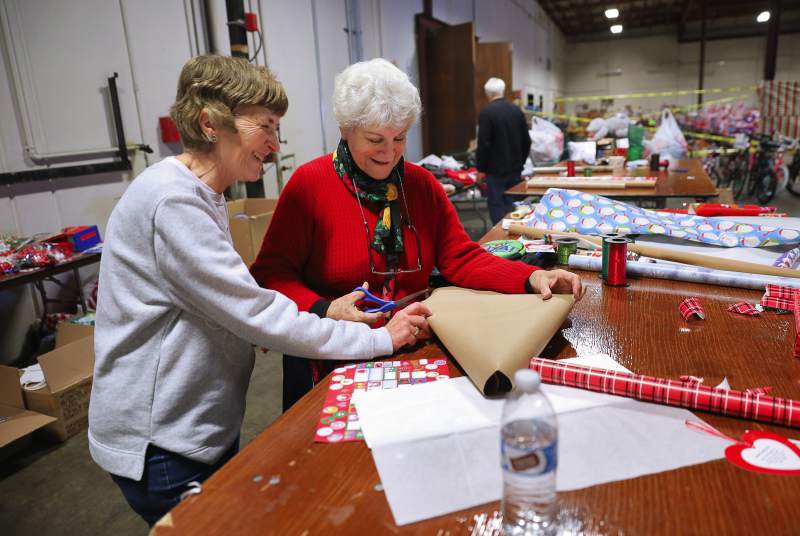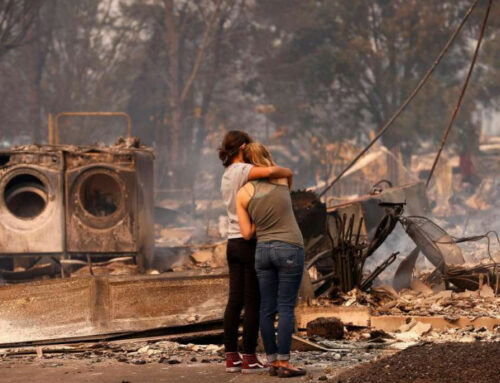“I want to help.” “I want to volunteer.” These offers came though hundreds of phone calls that flooded the Volunteer Center of Sonoma County starting at 6 a.m. the morning of the North Bay firestorm on Oct. 8, 2017.
Although the fires burned down homes and businesses in the North Bay, they did not mute the heart of the community. Even people who had lost their homes drove over to ask, “What can I do?”
VOLUNTEERING IS NATURAL
The human force that showed up to support victims of the recent Sonoma County disaster demonstrates the human need to be of service. Our participation satisfies our internal calling to help others.
“The human spirit is amazing,” said Cami Kahl, CEO of the Volunteer Center (www.volunteernow.org, 707-573-3399). “In times of disaster people’s natural response is to help. This innate quality ‘to serve’ even becomes active to some who never volunteered before. All the volunteers who came felt the urgency, and worked long hours to be of service.”
The impact of the fires quickly doubled the number of volunteers at the Sonoma County Volunteer Center from about 7,000 the previous year to 15,645 with about 10,458 volunteers immediately deployed into disaster relief activities. “This increase was stunning,” said Kahl.
In addition to providing basic necessities through the Volunteer Center, many volunteered to help residents fill out FEMA and insurance forms, and rental relief applications. Specialists like nurses, masseuses, therapists, musicians and others were also directed to evacuation sites.
HELP EACH OTHER OUT
“It has been remarkable to see how people have come together to support one another even when they are under stress from losing their own homes,” said Kahl.
In a Nov. 6, 2012, Scientific American article, Emma Seppala writes, “One reason why stress may lead to cooperative behavior is our profound need for social connection. Human beings are fundamentally social animals and it is the protective nature of our social relationships that has allowed our species to thrive.”
In fact, this human need is linked to both “psychological and physical health including a stronger immune system, faster recovery from disease and even longevity,” she added.
RETIREMENT
Volunteerism is also one of the pillars of a rewarding retirement. It provides the opportunity to do ongoing meaningful and fulfilling work. Helping others provides the purpose that retirees lose when they no longer have a job with a goal.
Although volunteers of all ages helped residents during the firestorm and continue to donate time to causes, retirees usually have more time to become involved. “Now we have a bank of people identified at the Volunteer Center by expertise, skills, languages, and other factors along with their contact information,” said Kahl. “If we have future emergencies, we will be able to place them in real time as we hear of needs.”
Although their contribution was significant not all volunteers have stayed. They have either gone back to their lives or moved away. Yet, the need for volunteers still exists and will continue to persist as the rebuild unfolds.
Participating through the Volunteer Center is a perfect fit for those who desire purpose and meaning in their lives. Kahl hopes to add more names to the volunteer registry to prepare for future emergencies. She also welcomes an invitation to speak about volunteering at organizational meetings.
COMMUNITY
In the book “Tribe: On Homecoming and Belonging,” Sebastian Junger describes how people come together during wars and other disasters to forge close relationships and support. There is something significant about striving together in the face of danger, he notes.
Community is also vital during retirement. We need each other in good times and bad. When we share our lives with others, our existence becomes more meaningful. This is evident as residents return to former neighborhoods to help those who stayed.
When Sonoma County Supervisor Shirlee Zane spoke on a “Rebuild” panel at a North Bay Business Journal conference, she shared how the disaster is bringing people together: “Some of us didn’t even know our neighbors until now.”
Since the firestorm, a lot of residents who lost their homes now come together for regular dinners. Zane has also been a dinner guest, where she says she always meets new people.
“They are lovely evenings,” she added.








